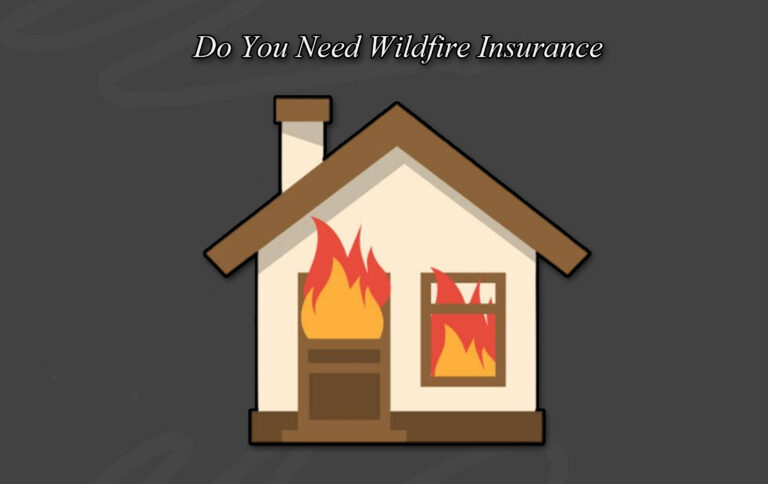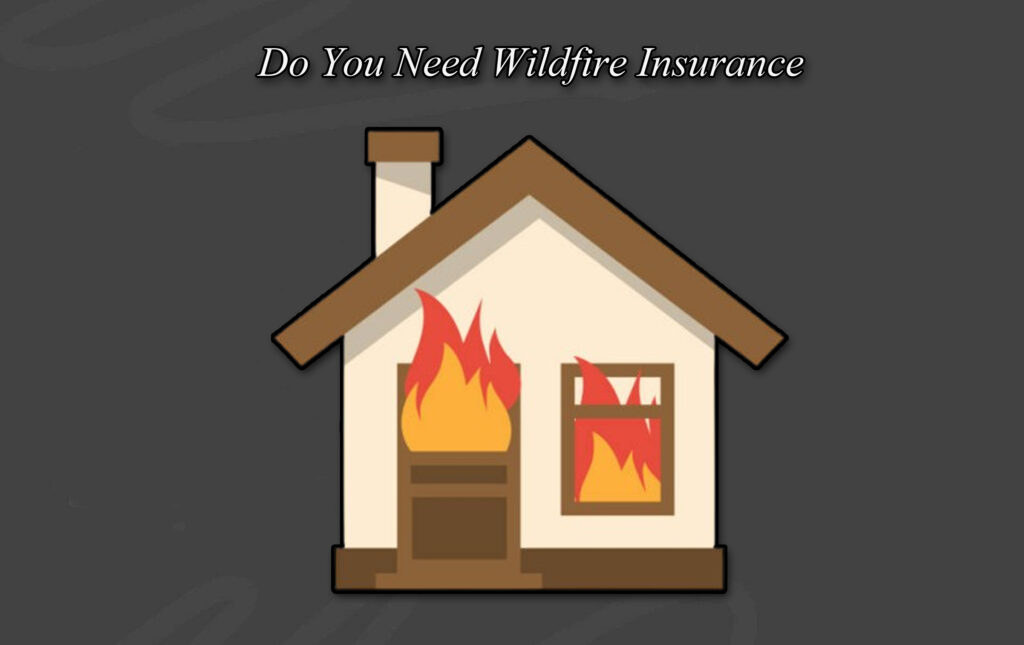
Do You Need Wildfire Insurance? Wildfires can strike suddenly and without warning, leaving destruction in their wake. Standard homeowners insurance policies may not always cover wildfire damage, or may have limitations.

So, do you need separate wildfire insurance? Let’s explore the options and help you determine if additional coverage is right for you.
In this article, we’ll examine wildfire insurance and all you need to know about it. So, whether you’re a homeowner in a high-risk area or simply want to be prepared, understanding your options can provide peace of mind and financial protection.
What Is Wildfire Insurance?
Wildfire insurance is a type of coverage that can be included in a standard home insurance policy. It helps protect your home and belongings if they are damaged or destroyed by a wildfire.
However, in areas where wildfires are common, many insurance companies are increasing premiums, limiting coverage, or refusing to renew policies. This is because they want to reduce their financial risk.
To make sure you’re protected, check your home insurance policy or quote carefully. Look at the perils it covers and excludes. Make sure wildfire is listed as a covered peril.
While home insurance often includes coverage for fire and smoke damage, what it actually protects can vary. Most policies cover:
- The main structure of your home
- Personal belongings
- Landscaping (in some cases)
- Required upgrades to meet building codes
- Additional living expenses
- Detached buildings, such as garages or sheds
Keep in mind, not all policies cover landscaping or detached buildings. It’s best to confirm with your provider.
Does Home Insurance Cover Wildfires?
In general, most home insurance policies include wildfire damage as part of their fire coverage. However, this may not apply if you live in a high-risk area. Insurance companies might reduce coverage, raise rates, or exclude wildfire protection altogether.
If your policy covers wildfire damage, here’s how it can help:
Dwelling Coverage
This pays to repair or rebuild the main structure of your home and any parts connected to it. In places like California, the cost to rebuild has increased by more than 33% over the past five years.
To keep up, you can ask for an inflation guard, get extended replacement cost coverage, or talk to your agent about raising your coverage limits.
Other Structures Coverage
This covers detached structures on your property, such as fences, sheds, or garages. It usually pays up to 10% of your dwelling limit. If you have special structures like a gazebo or guest house, make sure they’re included in your coverage.
Personal Property Coverage
This protects your belongings; like electronics, furniture, clothes, and appliances; if they’re damaged or lost due to a wildfire.
Even if your home isn’t completely destroyed, smoke can damage your items. Most home insurance policies offer personal property coverage equal to about 50% of the dwelling limit.
If you own valuable items, you may need to add an endorsement for extra protection.
Loss Of Use Coverage
Also called additional living expenses, this helps pay for housing, meals, and other daily costs if you can’t live in your home after a wildfire.
This coverage is especially important in states like California. Usually, the coverage limit for loss of use ranges between 20% and 30% of your dwelling coverage.
When Is Wildfire Damage Not Covered?
Even if your policy includes wildfire coverage, there are certain situations it won’t cover. For example, wildfires can lead to landslides, especially in hilly areas where plants have burned away.
Since landslides are considered “earth movement,” they’re not covered by standard home insurance. To cover that risk, you’d need separate insurance.
Does Condo Insurance Cover Wildfire?
Yes, condo insurance usually covers fire damage, including from wildfires, to the inside of your unit. This includes your walls, floors, and belongings.
The homeowners association (HOA) typically covers the building’s exterior and shared areas through a master insurance policy.
Like homeowners insurance, condo policies often include loss of use coverage if you’re forced to move out temporarily.
Does Renters Insurance Cover Wildfire?
Yes, renters insurance can cover wildfire damage. It protects your personal belongings and also includes coverage for temporary housing and other extra expenses if you can’t live in your rented home. Your landlord’s insurance only covers the building, not your personal items.
Where Can You Get Wildfire Insurance?
If your home insurance doesn’t include wildfire coverage, you might be able to add it. In high-risk areas, some insurance companies may not offer it. In that case, you can try getting coverage through a state-run program known as the FAIR Plan.
FAIR stands for Fair Access to Insurance Requirements. These plans are designed for people who can’t get insurance through regular providers. Some states also have rules to protect homeowners.
For example, after a wildfire, insurance companies may not be allowed to cancel your policy for one year. If your policy isn’t renewed, you have the right to appeal the decision.
In summary, wildfire insurance is essential if you live in a wildfire-prone area. Make sure to review your policy, ask questions, and understand exactly what is and isn’t covered. Being prepared can save you a lot of stress and money in the future.